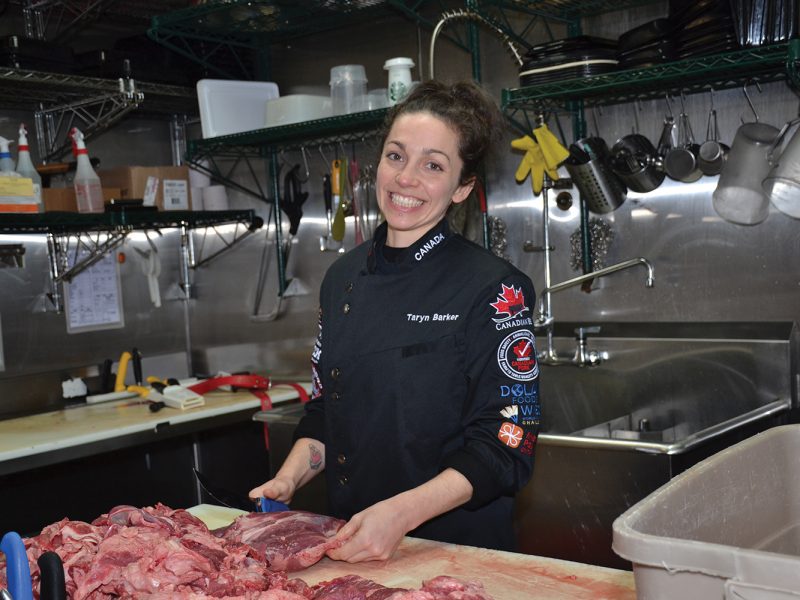PORT MOODY – Taryn Barker and Ronnie Keely were two BC representatives on Canada’s first-ever team in the World Butchers’ Challenge this year. Their experiences have inspired each of them to improve professional development opportunities in the province for those new to the sector.
Barker of The Little Butcher in Port Moody had nothing but positive reviews of the competition, which took place in Sacramento, September 3.
Barker’s career started in high school with a customer service job at George’s, a local butcher shop in Langley.
“I worked there for about seven years. I was managing, scheduling and cutting a little bit of meat but not a lot,” Barker says. “My then-boss wanted to open another store and he just asked if I would be interested.”
Following six years of co-ownership, she obtained 100% of the business, rebranded and moved the shop to Newport Village in Port Moody.
Now 33, Barker has owned The Little Butcher for 10 years.
The opportunity to own a butcher shop came up before she was able to go to school for formal training. However, Barker is enrolled in the Industry Training Authority’s meatcutter apprenticeship program, offered in partnership with Thompson Rivers University, with a view to becoming a certified meatcutter in the new year. Up until now she has learned to do by doing through the help of her past employer and textbook study.
In 2018, keen to expand her repertoire, Barker travelled to New Zealand to participate in a butcher competition.
“Their butchering is way more advanced – just the courses, the competition, like everything around butchery – they just have a lot more education and things going on for it,” Barker says.
About five months after she returned to BC, Barker saw posts on Instagram about Canada’s budding butcher team.
She then sent an application to Peter Baarda, the team’s captain. After completing 12 assignments over three months and submitting photos and videos of her creations, in 2019 Barker was chosen to be one of eight team members. The team was supposed to compete in 2020 but the pandemic delayed the event until this September.
During the competition, each team had three and a half hours to transform a side of beef, side of pork, whole lamb and five chickens into a butcher’s case display. The Canadian team had two breakers, two trimmers and two finishers.
“I was one of two finishers, … so we were doing all the garnishes, all the seasonings, getting all the marinades ready, cutting vegetables,” Barker says. “Then we were stuffing, tying and plating the meat and putting it out on the table for display.”
The solo Butcher Apprentice and Young Butcher competitions were also part of the program.
Passion for meat-cutting
Ronnie Keely of family-owned Kam Lake-View Meats Ltd. in Cherry Creek was one of two Canadians to participate in the Young Butcher Challenge.
For this category, the 14 competitors had two and half hours to display a beef top sirloin, half a lamb, two chickens and pork loin with a belly attached, complete with garnishes, labels and cooking instructions.
Keely knew his assignment inside and out and credits his skills and passion for meat cutting to being surrounded by the craft all his life.
“I just kind of grew up working here, [but] I never actually planned on being a butcher. I wanted to be more into the culinary aspect of it,” Keely says. “So, I went and took every course I could in cooking and then last-minute decided to go into the Retail Meat Processing program at TRU and ever since then, haven’t really looked back.”
Since graduating from Thompson Rivers University in 2009, he has worked full time at his family’s business.
He heard about the World Butchers’ Challenge at a BC Meats meeting when he ran into one of his university instructors.
About 15 students enter TRU’s Retail Meat Processing program each year, says the program’s assistant teaching professor Corey Davison. Despite over 90% of graduates staying to work in BC, the province does not have enough butchers nor cut-and-wrap facilities, he adds.
“Not a week goes by where I don’t get approached by some area of BC looking for more avenues for training meat cutters. We have a huge shortage,” Davison says.
“Small-scale farming has quite a demand for meat cutters and a lot of the older generations have retired and they’re having trouble getting someone young to sort of get in there and take over the reins. To sustain the local food movement, it’s pretty vital that we keep producing [butchers] in BC so we can keep BC-raised product on BC tables.”
Competitions and screen time could help attract and retain workers in this trade, Davison says.
“I think capitalizing on sort of the sexiness of the food networks that’s been accomplished with the culinary world,” he says. “I think there’s a lot of misconception about this trade. That it’s like a dirty, bloody, messy job. Yes, the abattoir is one side, but the polished craftsmanship to take an animal and display it in a high-level butchery and make sausages and charcuterie, that is quite a skill.”
Barker and Keely were blown away by the skills, styles and expertise of their teammates and competitors.
Keely hopes that through his participation and experiences, he can encourage more people to enter the trade.
Barker agrees.
“We don’t have a lot of that in BC,” she says of programs and supports for butchers. “So, I really hope we can kind of grow that and push that because we need people to work and you want something exciting for them to look forward to and things that are intriguing.”



 Christmas trees in demand
Christmas trees in demand